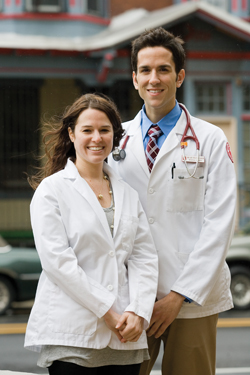Graduating med students leave the community a gift
Doctor of Medicine
|
Maybe 40 years ago, every neighborhood had its own physician who knew his patients well — from what their allergies were to what type of house they lived in — and altered their treatments accordingly. Unfortunately, according to graduating medical students Amy Ost and Brad Hayward, this often isn’t the case today. “Doctors for the most part don’t live where they work anymore,” said Ost. “We expect our patients to come into our world, which makes it harder to understand their successes and their struggles. If I have a patient who’s not taking their meds, is it because they’re stubborn, is it because they don’t understand what it’s for or is it because they can’t afford it?” It’s this drive for more community-centered health care that has driven Ost and Hayward to explore creating a center at Temple to help train future doctors to be more in tune with their patients’ needs. “Doctors today are not the bad guys,” said Hayward. “It’s completely the opposite — doctors are forced to do more with less and can only focus a small amount of time on treating a patient. Sometimes that means less than 15 minutes to figure out a treatment and send the patient on their way, without a more deep understanding of their lives.” The idea of housing an institute at Temple that addresses this very issue has been gaining momentum for the past year, thanks largely to the efforts of Hayward and Ost, who headed a steering committee of several faculty members from across Temple to bring the concept of such a center to life. |
 Photo by Ryan S. Brandenberg/Temple University
Graduating medical students Brad Hayward and Amy Ost have been instrumental in advancing a plan to create a new Center for Urban Bioethics and the Humanities in the Temple School of Medicine. |
|
In October, the committee presented its ideas to John Daly, dean of the medical school, and with his backing the Center for Urban Bioethics and the Humanities was born. Since then, both graduates worked with faculty members to address the issue at the core of the new center: treating the whole patient and not just the disease. The Center will open this fall in the new School of Medicine building. The students credit Kathleen Reeves, M.D., associate dean for student affairs at the medical school, for helping to guide them through the process and hone their vision. Currently, the University of Pennsylvania houses one of the leading bioethics centers in the world, focusing on issues related to high-tech advances in care and treatment. While Ost and Hayward both agree that it’s important to look at improvements to the technical element of medicine, they say it shouldn’t overshadow the human element. “The different aspect of this Center will be that it offers an interdisciplinary approach to teaching and research opportunities,” said Hayward. “Medical students could learn from scenes of human suffering in an art history lecture, or learn more about the lives of our patients by interviewing North Philadelphia residents with students from the journalism school.” Ost is familiar with the special needs of an underserved community: her father has practiced at a pharmacy at Front and Lehigh for the past 27 years. And although she’s received degrees from other institutions — a B.S. in neuroscience and behavioral biology from Emory University and a master’s in bioethics from Penn — the North Philadelphia community resonated with her, instilling a passion and desire to make a change in the lives of the individuals within these neighborhoods. “Temple is in a position to build a solid community of researchers and teachers of bioethics and medical humanities, and to see this community yield results that further its general mission,” said Ost, who heads to Columbia University this fall for her pediatrics residency. She’s hopeful that she can continue to spread the word of the brewing urban bioethics movement in North Philadelphia to the similar neighborhoods that surround Columbia University. “Most of the students who come here aren’t from North Philadelphia,” said Hayward, who is from rural Beaver Falls, Pa. “So this is an entirely new environment and patient population, and as doctors we need to make a concerted effort to understand them.” After receiving his B.A. in biology from Case Western Reserve University, he found a home at Temple and in North Philadelphia, and will stay at the hospital for his medicine residency. He says it’s the community right in the university’s backyard that the Center will focus on. “You can go all over the world to find people lacking basic health care, but you can also find the same thing right here." |
|